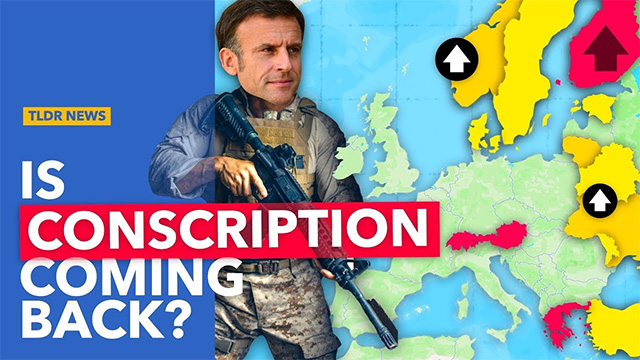
Jean-Dominique Merchet, author of ‘Are We Ready For War?’, says that the French army’s current capacity could hold a frontline no longer than 80 kilometers (50 miles) — compared to a Ukrainian front that’s about 1,000 kilometers long. Edward Luttwak, writing in ‘The Telegraph’, said that Europe’s political and cultural realities mean that if troops had to be sent to Russia tomorrow, only very small special units would be willing and able.
Hence, why governments are getting less squeamish about making it all less optional, notes Bloomberg.
“The French are all soldiers and must defend their homeland.” So decreed the 18th-century law that made military service mandatory in France, until the end of the Cold War banished it to the history books and replaced it with a kind of glorified recruitment day — which I dutifully attended as a teenager and promptly forgot about. Nobody under the age of 45 in France has forcibly worn army fatigues or picked up a weapon, including Emmanuel Macron.
Yet the return of war to Europe’s doorstep means France is one of several countries anxiously watching the Ukrainian frontline and debating whether it’s time to bring back the old ways of conscription or mandatory military service. But what’s needed now is planning rather than panic.
For those geographically closest to Russia, this is obviously less of a debate. Denmark has extended conscription to women and increased its duration, and Norway is following suit. New NATO member Sweden brought it back in 2018.
Further West, things get muddier: The UK is debating a “citizen army” instead of more unpopular conscription schemes, while in France, Macron is promoting “civic rearmament” with a focus on improving national unity. Germany, which faces the huge challenge of steering away from decades of pacifism, is mulling a return to conscription after ditching it in 2011.
The pressures forcing governments to break an often taboo subject are understandable. What NATO officials call “expecting the unexpected” has forced countries to start looking at their ability to fight in a more dangerous world. Two interlocking worries keep coming back: One is demographic, on an Old Continent where the median age is around 42 and birth rates are in decline. Demography may not be destiny, but in high-intensity warfare it counts for a lot.
The other challenge is voluntary recruitment into armies that have for years has been forced to do more with less. Militaries are struggling to recruit young people into a career that seems full of constraints and restrictions and light on perks and incentives — think secrecy, no social media, time away from home. The UK army has failed to meet its recruitment targets at all training centers for the past five years; France also missed its targets last year by around 2,000.
But although the debate is worth having, European countries should recognize that jumping back into a conscription mindset has limits. Rather than the typical accusations about today’s youngsters being weak and coddled, polls show that the under-40s who would refuse to fight in a country like the UK may be disillusioned by years of unjust wars.
read more in our Telegram-channel https://t.me/The_International_Affairs

 11:52 10.04.2024 •
11:52 10.04.2024 •






















